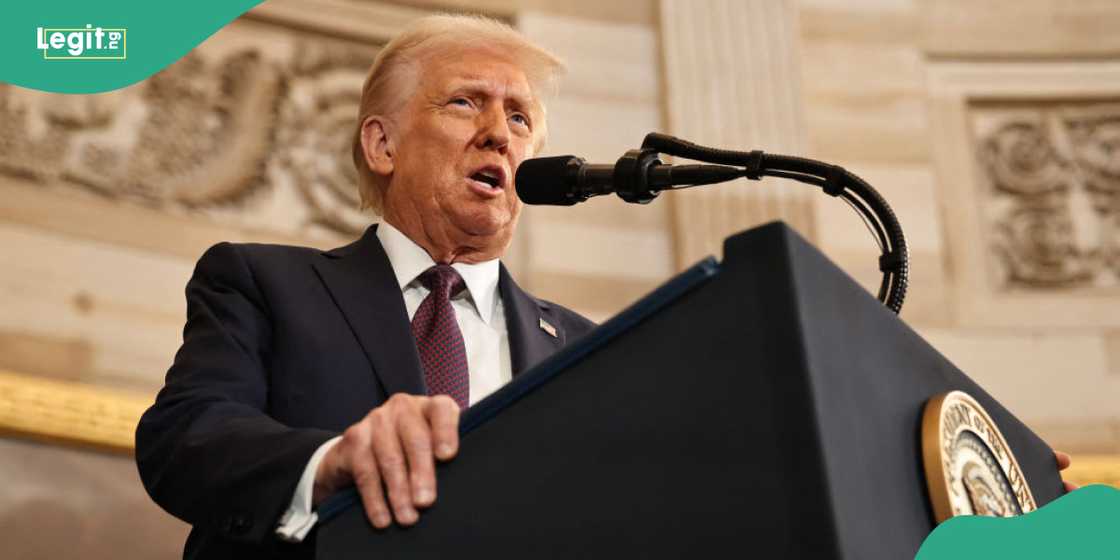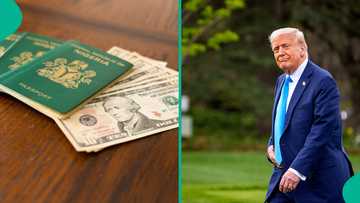Trump’s Reciprocal Tariffs: Full List of African Countries Affected
- President Trump’s new tariff policy aims to impose a 10% baseline tariff on all imports from countries without specific trade agreements with the U.S
- Under the reciprocal tariff concept, if a country imposes high tariffs on U.S. goods, the U.S. will impose an equivalent tariff on goods from that country
- The new policy may prompt African nations to retaliate with their own tariffs on U.S. exports, escalating trade tensions
Don't miss out! Join Legit.ng's Sports News channel on WhatsApp now!
Africa's economic ties with the United States are poised to undergo a significant shift following the announcement of President Donald Trump's new tariff policy.
The plan, which targets over 180 countries, includes several African nations.

Source: Getty Images
The new tariff strategy, described by Trump as "kind," seeks to address foreign tariffs, trade barriers, and alleged currency manipulation that the U.S. claims have hindered its businesses.
As noted by the White House in a post shared via X, countries without specific trade agreements with the U.S. will now face a 10% baseline tariff on all imports into the U.S.

Read also
US releases actual percentage of Nigerians denied visa in 2024, most denied country also announced
What does reciprocal tariffs is mean?
The idea behind reciprocal tariffs is straightforward: if a country imposes high tariffs on U.S. goods, the U.S. will respond with a similar tariff on goods from that country.
For African nations like South Africa, Nigeria, and Kenya, which maintain longstanding trade agreements with the U.S., this policy could drastically alter their economic relations with the U.S.
The 10% baseline tariff will apply to countries that are not part of the reciprocal tariff system, providing a level of protectionist measures for U.S. interests.
This represents a stark departure from the traditionally more open trade policies that have characterized U.S.-Africa trade relations.
Possible retaliation from African countries
The policy is already sparking concerns globally, as many countries, including those in Africa, may retaliate by imposing tariffs on U.S. exports, potentially escalating trade tensions.
List of African countries affected:
1. South Africa – 30% (charges U.S. 60%)
2. Madagascar – 47% (charges U.S. 93%)
3. Tunisia – 28% (charges U.S. 55%)
4. Egypt – 10% (charges U.S. 10%)
5. Côte d'Ivoire – 21% (charges U.S. 41%)
6. Botswana – 37% (charges U.S. 74%)
7. Morocco – 10% (charges U.S. 10%)
8. Algeria – 30% (charges U.S. 59%)
9. Nigeria – 14% (charges U.S. 27%)
10. Namibia – 21% (charges U.S. 42%)
11. Ethiopia – 10% (charges U.S. 10%)
12. Ghana – 10% (charges U.S. 17%)
13. Angola – 32% (charges U.S. 63%)
14. Democratic Republic of the Congo – 11% (charges U.S. 22%)
15. Mozambique – 16% (charges U.S. 31%)
16. Zambia – 17% (charges U.S. 33%)
17. Tanzania – 10% (charges U.S. 10%)
18. Senegal – 10% (charges U.S. 10%)
19. Cameroon – 11% (charges U.S. 22%)
20. Uganda – 10% (charges U.S. 20%)
21. Gabon – 10% (charges U.S. 10%)
22. Togo – 10% (charges U.S. 10%)
23. Malawi – 17% (charges U.S. 34%)
24. Liberia – 10% (charges U.S. 10%)
25. Zimbabwe – 18% (charges U.S. 35%)
26. Benin – 10% (charges U.S. 10%)
27. Republic of the Congo – 10% (charges U.S. 10%)
28. Djibouti – 10% (charges U.S. 10%)
29. Rwanda – 10% (charges U.S. 10%)
30. Sierra Leone – 10% (charges U.S. 10%)
31. Sudan – 10% (charges U.S. 10%)
32. Niger – 10% (charges U.S. 10%)
33. Equatorial Guinea – 13% (charges U.S. 25%)
34. Libya – 31% (charges U.S. 61%)
35. Guinea – 10% (charges U.S. 10%)
36. Chad – 13% (charges U.S. 26%)
37. Mali – 10% (charges U.S. 10%)
38. Mauritania – 10% (charges U.S. 10%)
39. Burundi – 10% (charges U.S. 10%)
40. Central African Republic – 10% (charges U.S. 10%)
41. Eritrea – 10% (charges U.S. 10%)
42. South Sudan – 10% (charges U.S. 10%)
43. Comoros – 10% (charges U.S. 10%)
44. São Tomé and Príncipe – 10% (charges U.S. 10%)
45. Guinea-Bissau – 10% (charges U.S. 10%)
Hayatu reacts to US' tariff policies
Reacting to growing concerns over America's unilateral trade decisions, Hamma Hayatu, a respected public affairs analyst, while speaking with Legit.ng on Sunday, April 6, questioned the continued dominance of the U.S. dollar in international transactions.
Hayatu said:
“If the United States can just wake up one day and impose tariffs on the rest of the world, thereby making life difficult for many nations, then why shouldn’t the international community consider dropping the U.S. dollar as the global business currency—starting with the petrodollar system?
"Doing so would significantly impact the U.S., perhaps enough to restore balance in international trade relations.”
Hayatu’s comments reflect mounting frustration among global analysts and policymakers over the perceived weaponization of the dollar and U.S. economic policies.
22 African countries Trump targets for visa ban
Earlier, Legit.ng reported that According to an internal memo, the Donald Trump administration is considering implementing comprehensive travel restrictions on citizens from several African nations.
The memo cited by Reuters and The New York Times lists over 40 countries, 22 of which are in Africa. The countries listed under the proposed restrictions are divided into three separate groups.
PAY ATTENTION: Сheck out news that is picked exactly for YOU ➡️ find the “Recommended for you” block on the home page and enjoy!
Source: Legit.ng






